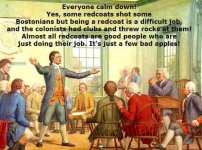You are using an out of date browser. It may not display this or other websites correctly.
You should upgrade or use an alternative browser.
You should upgrade or use an alternative browser.
what most of you slaves look like defending cops who break the law
- Thread starter SmarterthanYou
- Start date
SmarterthanYou
rebel
In the Boston Massacre, some Red Coats shot some Bostonians in 1770. The Red Coats were defended in court by John Adams, one of the Founding Fathers. He was also one of the authors of the model for the Bill Of Rights, the Massachusetts' Declaration of Rights.
So a similar thing happened to what you have pictured here, but it was in a courtroom. I am just saying that the Founding Fathers wrestled with the same issues we are wrestling with now. I have no reason to believe that 250 years from now our descendants will not be wrestling with these issues, but I sure hope they are not.

Boston Massacre - Wikipedia
While somewhat exaggerated, you do make a valid point.
T. A. Gardner
Serial Thread Killer
Well, it is California, and the driver is a White male...
T. A. Gardner
Serial Thread Killer
Their issue with the Crown wasn't one of public order, but rather fair and equal treatment under the law in terms of citizenry, trade, and economics.In the Boston Massacre, some Red Coats shot some Bostonians in 1770. The Red Coats were defended in court by John Adams, one of the Founding Fathers. He was also one of the authors of the model for the Bill Of Rights, the Massachusetts' Declaration of Rights.
So a similar thing happened to what you have pictured here, but it was in a courtroom. I am just saying that the Founding Fathers wrestled with the same issues we are wrestling with now. I have no reason to believe that 250 years from now our descendants will not be wrestling with these issues, but I sure hope they are not.

Boston Massacre - Wikipedia
en.wikipedia.org
Americans were sort of EINO's (English in Name Only). They weren't full British citizens. Britain's government and the Crown saw them as equally represented in Parliament as Parliament represented all English territory, including colonies, even if the colonies got no actual representatives. That was the issue of things like "No taxation without representation!"
The colonies were also differentially taxed and faced stiff trade barriers with the home nation. The later were designed to prevent any colony from developing industries or resources that would threaten those industries or resources being produced in England. So, for example, the power loom, a machine central to the textile industry was forbidden for export. One was snuck out of England, along with plans, to the American colonies where it was quickly duplicated.
This meant that the colonies could produce cheap cloth like England and eliminated the need to import finished cloth from England. Much of English relationship with their colonies hinged on importing raw goods and exporting finished products. The colonies were discouraged from developing their own means of production of finished goods to prevent competition.
For the Southern American colonies this was acceptable as agriculture was the primary industry. In the Northern colonies, they were becoming more and more independent of England preferring to industrialize over exploit increasingly scarce natural resources.
I agree the issue in the Revolution was not public order. The issue in the Boston Massacre was public order, and one of the issues in the Bill of Rights was public order. So, it would be fair to say immediately before and after the Revolution, people were dealing with this issue.Their issue with the Crown wasn't one of public order,
It has been with us since the beginning of civilization, and I have no reason to believe it will go away any time soon.
I understand what you are saying, and I am just disagreeing with you on a technicality, sort of... Anyway, the British had no citizens. The concept of citizenship was really reintroduced into Europe by the later French Revolution. Britain had subjects.Americans were sort of EINO's (English in Name Only). They weren't full British citizens.
Most subjects could not vote, where ever they were. After the American Revolution, most Americans could not vote. Even most white men over the age of 25 could not or did not vote.
The question was distance of government. British Government was off in London, so disconnected from America. Not that was always bad. Distant government was more likely to free slaves, or respect natives than the local government who owned slaves and wanted to steal natives property.
T. A. Gardner
Serial Thread Killer
Voting should be a privilege granted to many in society but not universal. I'd start by limiting it to owners. That is, persons with a minimum net worth, or who own property not rent, that sort of thing. Those on any sort of public assistance like SNAP, welfare, unemployment, etc., are ineligible to vote.Most subjects could not vote, where ever they were. After the American Revolution, most Americans could not vote. Even most white men over the age of 25 could not or did not vote.
Why? Because those receiving the benefits of society without having a vested interest in society economically shouldn't be deciding what government funds, and that's the major thing government does. It argues that in order to participate in electing government, you have to have a vested interest in the nation and its betterment. Little or no participation, no vote.
The man who owns the boat rarely has time to rock it.
A man who owns a slave would rarely want to free the slaves. Limiting voting to a few means that they will use government to steal from the rest.Voting should be a privilege granted to many in society but not universal. I'd start by limiting it to owners. That is, persons with a minimum net worth, or who own property not rent, that sort of thing. Those on any sort of public assistance like SNAP, welfare, unemployment, etc., are ineligible to vote.
Why? Because those receiving the benefits of society without having a vested interest in society economically shouldn't be deciding what government funds, and that's the major thing government does. It argues that in order to participate in electing government, you have to have a vested interest in the nation and its betterment. Little or no participation, no vote.
The man who owns the boat rarely has time to rock it.
T. A. Gardner
Serial Thread Killer
Slavery is illegal. But that aside, perpetual welfare is a form of slavery only the person enslaved is owned by the government. Limiting voting to owners in society means the government can't buy votes using social welfare programs like they can now to steal from those who are still free while increasing those enslaved by government handouts.A man who owns a slave would rarely want to free the slaves. Limiting voting to a few means that they will use government to steal from the rest.
It is now. We were one of the last Western countries to ban it, because we had a voting class that was not so remote that they would not lose money from banning it, but not so complete that they would pressure to release the slaves.Slavery is illegal.
If only the elite can vote, I believe they will reestablish some form of slavery. They will make it illegal for us to leave our jobs with them, or to negotiate for more money.
You are a good worker for the plutocracy. Not much for the American experiment and Democracy.Voting should be a privilege granted to many in society but not universal. I'd start by limiting it to owners. That is, persons with a minimum net worth, or who own property not rent, that sort of thing. Those on any sort of public assistance like SNAP, welfare, unemployment, etc., are ineligible to vote.
Why? Because those receiving the benefits of society without having a vested interest in society economically shouldn't be deciding what government funds, and that's the major thing government does. It argues that in order to participate in electing government, you have to have a vested interest in the nation and its betterment. Little or no participation, no vote.
The man who owns the boat rarely has time to rock it.


